-
 Bitcoin
Bitcoin $118800
-0.43% -
 Ethereum
Ethereum $4231
-0.53% -
 XRP
XRP $3.140
-1.41% -
 Tether USDt
Tether USDt $1.000
-0.02% -
 BNB
BNB $808.5
0.57% -
 Solana
Solana $175.1
-4.38% -
 USDC
USDC $0.9999
0.01% -
 Dogecoin
Dogecoin $0.2229
-4.71% -
 TRON
TRON $0.3458
2.18% -
 Cardano
Cardano $0.7744
-3.43% -
 Hyperliquid
Hyperliquid $43.19
-4.44% -
 Chainlink
Chainlink $21.19
-4.12% -
 Stellar
Stellar $0.4313
-2.84% -
 Sui
Sui $3.659
-5.59% -
 Bitcoin Cash
Bitcoin Cash $580.1
1.65% -
 Hedera
Hedera $0.2472
-4.61% -
 Ethena USDe
Ethena USDe $1.001
-0.03% -
 Avalanche
Avalanche $22.88
-3.98% -
 Litecoin
Litecoin $120.5
-2.63% -
 Toncoin
Toncoin $3.375
0.74% -
 UNUS SED LEO
UNUS SED LEO $8.984
-1.31% -
 Shiba Inu
Shiba Inu $0.00001296
-4.28% -
 Uniswap
Uniswap $11.06
1.08% -
 Polkadot
Polkadot $3.869
-4.65% -
 Cronos
Cronos $0.1664
1.09% -
 Dai
Dai $1.000
0.00% -
 Ethena
Ethena $0.7979
0.07% -
 Bitget Token
Bitget Token $4.395
-1.14% -
 Monero
Monero $268.2
-0.19% -
 Pepe
Pepe $0.00001125
-6.91%
What is the difference between Bitcoin’s leverage trading and perpetual contract trading?
Leverage trading in Bitcoin amplifies potential profits and losses by utilizing borrowed funds to increase buying power and expose traders to a larger number of assets.
Dec 16, 2024 at 12:33 pm
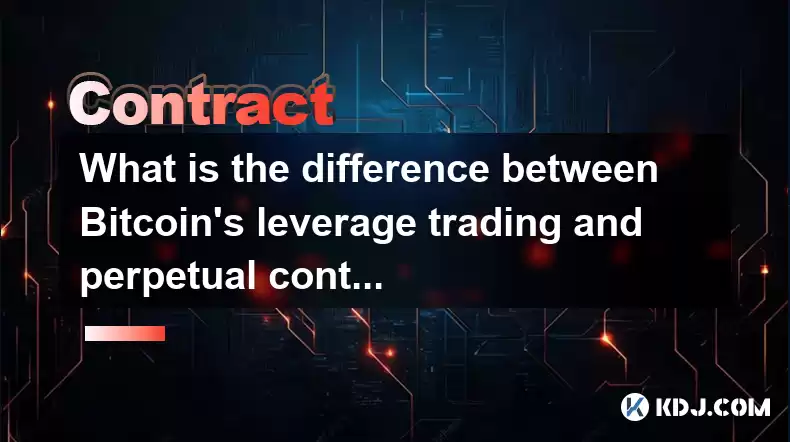
Understanding Leverage Trading in Bitcoin
Definition of Leverage Trading: Leverage trading is a financial technique that allows traders to borrow funds from a broker to increase their buying power and potential profits. By utilizing leverage, traders can gain exposure to a larger number of assets with a smaller initial investment. In Bitcoin trading, leverage trading enables traders to amplify their returns by borrowing funds to purchase more Bitcoin than they could afford with their own capital.
Key Features:
- Margin Requirements: Traders must maintain a specific margin requirement, which is a percentage of the total trade value, to utilize leverage.
- Margin Call: If the market moves against a leveraged position and the available margin falls below the required level, the broker may issue a margin call, requiring the trader to deposit additional funds or close the position.
- Risk Management: Leverage trading involves higher potential rewards but also amplifies potential losses. It is crucial for traders to employ sound risk management strategies, such as setting stop-loss orders, to mitigate downside risks.
Benefits of Leverage Trading in Bitcoin:
- Increased Buying Power: Leverage enables traders to amplify their initial investment and purchase a larger amount of Bitcoin, thus increasing their potential for higher returns.
- Profit Optimization: With leverage, traders can capitalize on small market movements and maximize profits.
- Short-Selling Opportunities: Leverage trading allows traders to take short positions, enabling them to profit from a decline in Bitcoin's price.
Risks of Leverage Trading in Bitcoin:
- Amplified Losses: While leverage can magnify profits, it can also amplify losses. If the market moves against the leveraged position, traders could face substantial losses.
- Margin Calls: Leverage trading can lead to margin calls, forcing traders to close their positions or deposit additional funds. Failing to meet a margin call can result in account liquidation.
- Volatility Risks: Bitcoin is known for its price volatility. Leverage trading in Bitcoin exposes traders to amplified price fluctuations, potentially resulting in significant losses.
Understanding Perpetual Contract Trading in Bitcoin
Definition of Perpetual Contract Trading: Perpetual contract trading involves trading futures contracts that do not have an expiry date, meaning they can be held indefinitely. In Bitcoin perpetual contract trading, traders speculate on the future price of Bitcoin without actually owning the underlying asset. Instead, they enter into agreements to buy (long position) or sell (short position) Bitcoin at a future date at a predetermined price.
Key Features:
- Perpetual Nature: Contracts do not expire and can be held for as long as the trader desires.
- Funding Rate: Perpetual contracts have a funding mechanism that ensures price convergence with the spot market.
- Margin Requirements: Traders must maintain a sufficient margin balance to cover potential losses, similar to leverage trading.
Benefits of Perpetual Contract Trading in Bitcoin:
- Continuous Trading: Traders can benefit from continuous trading opportunities without the constraints of contract expiry dates.
- Leverage Trading: Perpetual contracts allow traders to utilize leverage, increasing their buying power and potential profits.
- Hedging and Risk Management: Traders can use perpetual contracts for hedging purposes or to mitigate risks in their existing Bitcoin portfolio.
Risks of Perpetual Contract Trading in Bitcoin:
- Market Volatility: Like leverage trading, perpetual contract trading exposes traders to amplified price fluctuations and potential losses.
- Funding Risk: Funding rates can fluctuate, potentially adding to or reducing profits.
- Liquidation Risk: If the margin balance falls below the required level, traders may face liquidation, leading to significant losses.
Comparison of Bitcoin Leverage Trading and Perpetual Contract Trading
While both leverage trading and perpetual contract trading in Bitcoin offer opportunities for increased profits, they differ in several key aspects:
- Underlying Asset: Leverage trading involves borrowing funds to purchase the underlying Bitcoin asset, while perpetual contract trading simply involves speculating on the future price of Bitcoin without ownership.
- Contract Expiration: Leverage trading typically involves short-term positions that are closed out within a specific timeframe. In contrast, perpetual contract trading allows traders to hold positions indefinitely.
- Settlement: Leverage trading requires physical delivery of the Bitcoin asset at the contract expiry date, whereas perpetual contract trading settles in cash based on the underlying index price.
- Pricing: Leverage trading prices are typically based on spot market prices, while perpetual contract prices are influenced by both spot prices and funding rates.
- Risk Profile: Leverage trading generally carries a higher risk profile due to the increased exposure to price fluctuations and margin calls. Perpetual contract trading offers a slightly lower risk profile as contracts do not have an expiry date.
Disclaimer:info@kdj.com
The information provided is not trading advice. kdj.com does not assume any responsibility for any investments made based on the information provided in this article. Cryptocurrencies are highly volatile and it is highly recommended that you invest with caution after thorough research!
If you believe that the content used on this website infringes your copyright, please contact us immediately (info@kdj.com) and we will delete it promptly.
- Dogecoin's Wild Ride: Big Holders, Price Push, and What's Next for the Meme Coin
- 2025-08-12 08:30:12
- Bitcoin to $133,000? Here's What the Experts Are Saying
- 2025-08-12 08:30:12
- Dogecoin, Meme Coins, and Whale Buys: What's the Hype?
- 2025-08-12 06:50:12
- Bitcoin, Ethereum, and the Pump-and-Dump Merry-Go-Round: A New Yorker's Take
- 2025-08-12 07:10:12
- MAGACOIN Mania: Why Holders Are Staking Their Claim in This Bull Season
- 2025-08-12 06:30:13
- Heritage Distilling's Bold Bet: A $360M IP Treasury Powered by Story Protocol
- 2025-08-12 06:30:13
Related knowledge
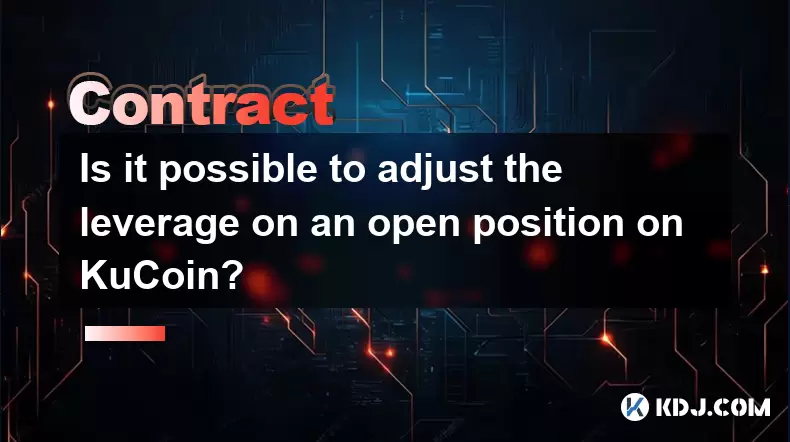
Is it possible to adjust the leverage on an open position on KuCoin?
Aug 09,2025 at 08:21pm
Understanding Leverage in KuCoin Futures TradingLeverage in KuCoin Futures allows traders to amplify their exposure to price movements by borrowing fu...

What cryptocurrencies are supported as collateral on KuCoin Futures?
Aug 11,2025 at 04:21am
Overview of KuCoin Futures and Collateral MechanismKuCoin Futures is a derivatives trading platform that allows users to trade perpetual and delivery ...
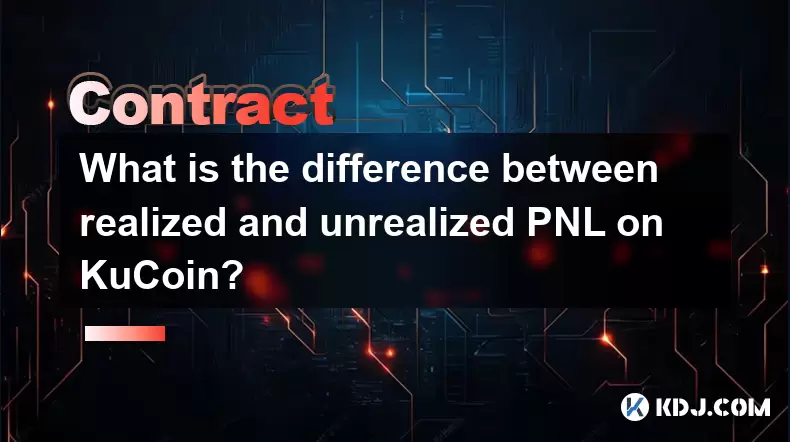
What is the difference between realized and unrealized PNL on KuCoin?
Aug 09,2025 at 01:49am
Understanding Realized and Unrealized PNL on KuCoinWhen trading on KuCoin, especially in futures and perpetual contracts, understanding the distinctio...

How does KuCoin Futures compare against Binance Futures in terms of features?
Aug 09,2025 at 03:22am
Trading Interface and User ExperienceThe trading interface is a critical component when comparing KuCoin Futures and Binance Futures, as it directly i...
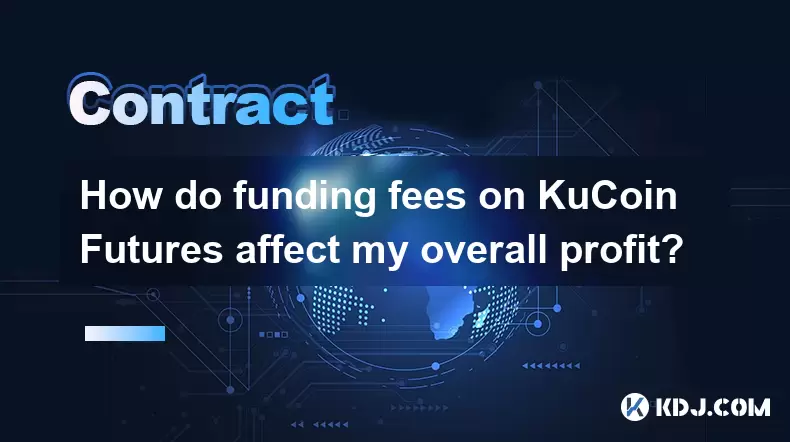
How do funding fees on KuCoin Futures affect my overall profit?
Aug 09,2025 at 08:22am
Understanding Funding Fees on KuCoin FuturesFunding fees on KuCoin Futures are periodic payments exchanged between long and short position holders to ...
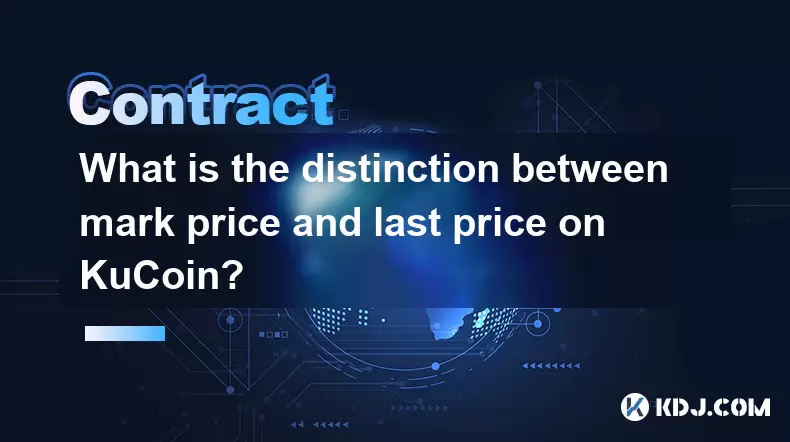
What is the distinction between mark price and last price on KuCoin?
Aug 08,2025 at 01:58pm
Understanding the Basics of Price in Cryptocurrency TradingIn cryptocurrency exchanges like KuCoin, two key price indicators frequently appear on trad...

Is it possible to adjust the leverage on an open position on KuCoin?
Aug 09,2025 at 08:21pm
Understanding Leverage in KuCoin Futures TradingLeverage in KuCoin Futures allows traders to amplify their exposure to price movements by borrowing fu...

What cryptocurrencies are supported as collateral on KuCoin Futures?
Aug 11,2025 at 04:21am
Overview of KuCoin Futures and Collateral MechanismKuCoin Futures is a derivatives trading platform that allows users to trade perpetual and delivery ...

What is the difference between realized and unrealized PNL on KuCoin?
Aug 09,2025 at 01:49am
Understanding Realized and Unrealized PNL on KuCoinWhen trading on KuCoin, especially in futures and perpetual contracts, understanding the distinctio...

How does KuCoin Futures compare against Binance Futures in terms of features?
Aug 09,2025 at 03:22am
Trading Interface and User ExperienceThe trading interface is a critical component when comparing KuCoin Futures and Binance Futures, as it directly i...

How do funding fees on KuCoin Futures affect my overall profit?
Aug 09,2025 at 08:22am
Understanding Funding Fees on KuCoin FuturesFunding fees on KuCoin Futures are periodic payments exchanged between long and short position holders to ...

What is the distinction between mark price and last price on KuCoin?
Aug 08,2025 at 01:58pm
Understanding the Basics of Price in Cryptocurrency TradingIn cryptocurrency exchanges like KuCoin, two key price indicators frequently appear on trad...
See all articles

























































































